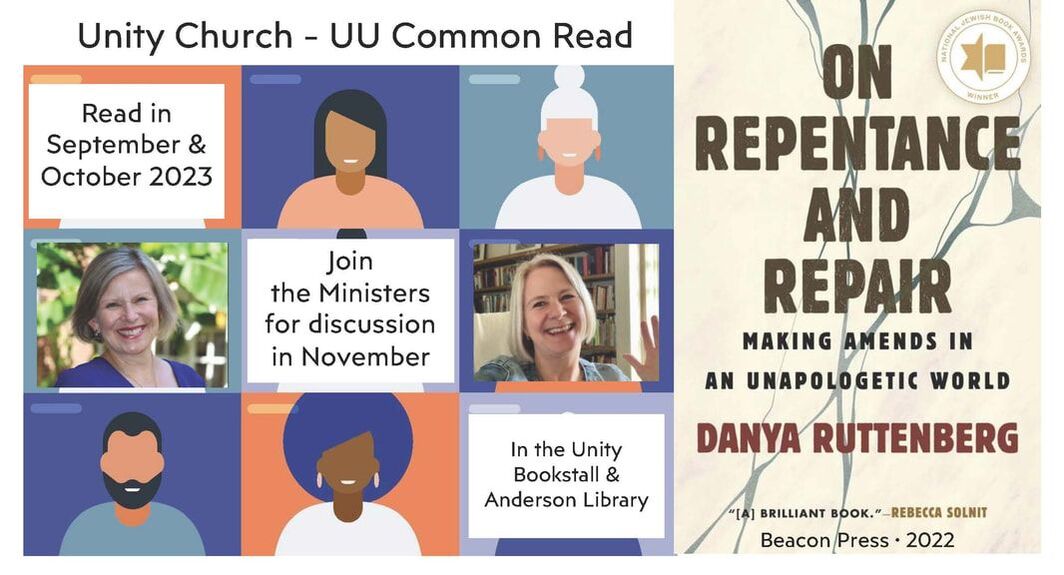|
By Shelley Butler, Beloved Community Communications Team and Library-Bookstall Team A UU Common Read can take us on a powerful journey into what it means to be human and accountable in a world filled with both pain and joy. —Unitarian Universalist Association
A Unity friend told me recently that her husband was exhilarated by our congregation read book, On Repentance and Repair: Making Amends in an Unapologetic World by Danya Ruttenberg; that his copy was full of bookmarks and notes in the margin, and that he was planning to purchase the book for others in their family. This is not something you’d necessarily expect to hear about a book that teaches us in five steps to do the work of repentance personally and collectively, but we hope that his enthusiasm will inspire you and others to participate in the read and this work. Dismantling white supremacy and making reparations for the shame of slavery or reparations for stolen land and genocide of Native Americans often feels overwhelming. Even figuring out how to right a wrong against just one person we have harmed can provoke anxiety. But, as is quoted in On Repentance and Repair, “If you believe that you can do damage, believe that you can fix it. If you believe that you can do harm, believe that you can heal.” Let’s not let the enormity of what we need to do cut us off at the knees. This book, the opportunity to delve more deeply into it in an Antiracism Literacy Partners group, and the “Repentance and Repair in Our Lives and Relationships” discussions coming up at Unity in November provide us with the guidance to continue the antiracism and right relations work we’ve already started at Unity, but also support those of us who may be just beginning this work, step by step. In the book, Rabbi Ruttenberg outlines the path based on the work of 12th century-medieval Sephardic Jewish philosopher Moses ben Maimon, more commonly known as Maimonides, and deftly applies these principles to today. The first step is “naming and owning harm,” or confessing (our worship theme for October). Ruttenberg acknowledges the challenge, but also the tendency to minimize harm by making excuses and justifications. How often have we heard and even said, “But I didn’t mean to”? She writes, “Addressing harm is possible only when we bravely face the gap between the story we tell ourself — the one in which we’re the hero, fighting the good fight, doing our best, behaving responsibly and appropriately in every context — and the reality of our actions.” It may be true that our intentions are good and that we are doing our best, but that doesn’t negate harm we’ve caused or inherited nor the responsibility to make amends. The steps beyond confession — both public and private — include change, restitution, consequences, apologies, and making better choices; or in other words, transformation that leads to healing and a more just world. So many important questions are answered here: How do we handle harm when we see it around us? In an antiracism workshop at Unity, there was talk of weaponizing the traits of white supremacy culture listed by Tema Okum. What is the difference between calling out harm when we see it and weaponizing a tool that helps us understand it? What about the harm caused by the institutions, like Unity Church, or workplaces, schools, universities, or social groups; justice systems—policing, courts, prisons; and the nation? How do we hold ourselves and these larger arenas accountable, and what is our responsibility? Is national repentance, for example, possible; and can we learn from Germany and South Africa? Beyond accountability, how can we atone and make amends? Even as I write this, the questions loom large, and on my own, I could never answer them. But in a community such as ours that values truth, honest storytelling, and healing, and with resources, workshops, and discussions like the Unity-UU Common Read, maybe together we can summon the bravery to begin and the willingness to continue the work, and the faith that “on the other side of transformation is another more whole, more full, more free way of being, one that we can’t fully imagine from here.” Sounds a lot like a walk towards beloved community, doesn’t it? Won’t you join us? On Repentance and Repair: Making Amends in an Unapologetic World by Danya Ruttenberg. Beacon Press, 2022. In the Unity Bookstall (paperback, $18), and in the Anderson Library (202.2 R). Unity–UU Common Read Events: Repentance and Repair in Our Lives and Relationships Led by Rev. Kathleen Rolenz and Rev. Lara Cowtan
Antiracism Literacy Partners, Tuesday, December 5, 2023. Meet to learn about the program and sign up for a group to take a deeper dive into On Repentance and Repair. On Zoom, register today!
0 Comments
Leave a Reply. |
Topics
All
Beloved Community ResourcesUnity Justice Database
Team Dynamics House of Intersectionality Anti-Racism Resources in the Unity Libraries Collection Creative Writers of Color in Unity Libraries The History of Race Relations and Unity Church, 1850-2005 Archives
July 2024
Beloved Community Staff TeamThe Beloved Community Staff Team (BCST) strengthens and coordinates Unity’s antiracism and multicultural work, and provides opportunities for congregants and the church to grow into greater intercultural competency. We help the congregation ground itself in the understanding of antiracism and multiculturalism as a core part of faith formation. We support Unity’s efforts to expand our collective capacity to imagine and build the Beloved Community. Here, we share the stories of this journey — the struggles, the questions, and the collaborations — both at Unity and in the wider world.
The current members of the Beloved Community Staff Team include Rev. Kathleen Rolenz, Rev. KP Hong, Rev. Lara Cowtan, Drew Danielson, Laura Park, Lia Rivamonte and Angela Wilcox. |
